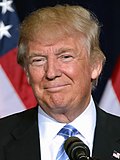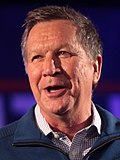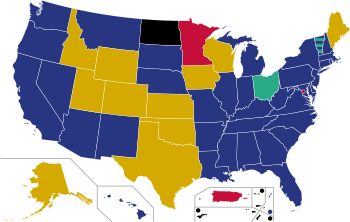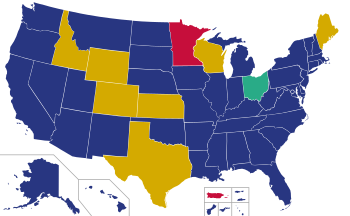
Back Risultati delle elezioni primarie del Partito Repubblicano del 2016 per stato Italian Results of the 2016 Republican Party presidential primaries SIMPLE
| |||||||||||||||||||||||||||||||||||||||||||||||
2,472 delegates to the Republican National Convention 1,237 delegate votes needed to win | |||||||||||||||||||||||||||||||||||||||||||||||
|---|---|---|---|---|---|---|---|---|---|---|---|---|---|---|---|---|---|---|---|---|---|---|---|---|---|---|---|---|---|---|---|---|---|---|---|---|---|---|---|---|---|---|---|---|---|---|---|
| |||||||||||||||||||||||||||||||||||||||||||||||
| |||||||||||||||||||||||||||||||||||||||||||||||
| |||||||||||||||||||||||||||||||||||||||||||||||
2016 U.S. presidential election | |
|---|---|
| Republican Party | |
| Democratic Party | |
| Third parties | |
| Related races | |
| |
This article contains the results of the 2016 Republican presidential primaries and caucuses, the processes by which the Republican Party selected delegates to attend the 2016 Republican National Convention from July 18–21. The series of primaries, caucuses, and state conventions culminated in the national convention, where the delegates cast their votes to formally select a candidate. A simple majority (1,237) of the total delegate votes (2,472) was required to become the party's nominee and was achieved by the nominee, businessman Donald Trump of New York.
The process began on March 23, 2015, when Texas Senator Ted Cruz became the first presidential candidate to announce his intentions to seek the office of United States President. That summer, 17 major candidates were recognized by national and state polls, making it the largest presidential candidate field for any single political party in American history.[2] The large field made possible the fact that the 2016 primaries were the first since 1968 (and the first in which every state held a contest) in which more than three candidates won at least one state.
When voting began in the 2016 Iowa caucuses, twelve major candidates were actively campaigning; these were (ordered by date of withdrawal from the race) former Governor Mike Huckabee of Arkansas, former Senator Rick Santorum of Pennsylvania, Senator Rand Paul of Kentucky, Governor Chris Christie of New Jersey, businesswoman and former Hewlett-Packard Chief Executive Officer Carly Fiorina, former Governor Jim Gilmore of Virginia, Governor Jeb Bush of Florida, former neurosurgeon and Johns Hopkins University Director of Pediatric Neurosurgery Ben Carson, Senator Marco Rubio of Florida, Senator Ted Cruz of Texas, Governor John Kasich of Ohio, and the eventual nominee, businessman and Trump Organization CEO Donald Trump.
Following poor results from the first-in-the-nation caucus, Huckabee was the first candidate to drop out.[3] Santorum also ended his campaign after a poor performance in Iowa.[4] Paul withdrew from the race after placing fifth in Iowa, and subsequently polling poorly leading into the New Hampshire primary.[4] Christie, who put nearly all of his campaign's resources into the critical state of New Hampshire, withdrew on February 10, 2016, after finishing sixth in the state.[5] Following Christie's announcement, Fiorina suspended her campaign, which was unable to gain traction. Gilmore, who severely lacked funding, campaign infrastructure, and support, surprised many political pundits by staying in the race as far as he did; he dropped out shortly after the New Hampshire primary.[6] Bush withdrew from actively campaigning after finishing fourth in the South Carolina primary.[7] After Super Tuesday, Carson announced that there would be "no path forward" for his bid for the Presidency, effectively suspending his campaign.[8] On March 15, 2016, Rubio dropped out after losing his home state, leaving three active candidates (Cruz, Kasich, and Trump).[9] Trump's resounding victory in the Indiana primary on May 3, 2016, prompted Cruz's exit from the race. The following day, Trump became the presumptive Republican nominee after Kasich dropped out. Trump was formally nominated by the delegates of the 2016 Republican National Convention on July 19, 2016, and proceeded to defeat Democratic nominee Hillary Clinton in the general election on November 8, 2016, to become the 45th President of the United States.
- ^ a b c d e f g h Berg-Andersson, Richard E. "Republican Convention". The Green Papers. Retrieved August 10, 2016.
- ^ Linshi, Jack. "More People Are Running for Presidential Nomination Than Ever". TIME.com. Retrieved February 14, 2016.
- ^ "Mike Huckabee drops out of 2016 presidential race - CNNPolitics.com". CNN. Retrieved February 11, 2016.
- ^ a b Parker, Ashley (February 3, 2016). "Rand Paul and Rick Santorum Pull Out of G.O.P. Nomination Race". The New York Times. ISSN 0362-4331. Retrieved February 11, 2016.
- ^ "Christie Expected to End Presidential Bid as Early as Today". ABC News. February 10, 2016. Retrieved February 10, 2016.
- ^ "Christie, Fiorina suspend 2016 campaigns | Fox News". Fox News. February 10, 2016. Retrieved February 11, 2016.
- ^ Parker, Ashley; Barbaro, Michael (February 20, 2016). "Jeb Bush Bows Out of Campaign, Humbled and Outgunned". The New York Times. ISSN 0362-4331. Retrieved February 21, 2016.
- ^ Graham, David A. "Ben Carson Accepts That His Campaign Is Finished". The Atlantic. Retrieved March 3, 2016.
- ^ Peters, Jeremy; Barbaro, Michael (March 16, 2016). "Marco Rubio Suspends His Presidential Campaign". Retrieved March 16, 2016.
© MMXXIII Rich X Search. We shall prevail. All rights reserved. Rich X Search






